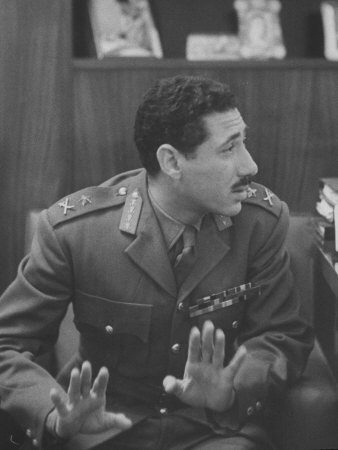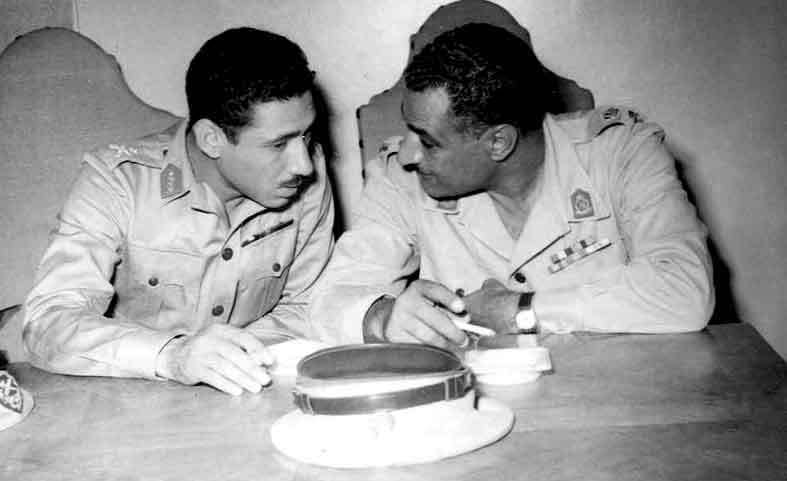<Back to Index>
- Field Marshal of the Egyptian Army and Vice President of Egypt Mohamed Abdel Hakim Amer, 1919
PAGE SPONSOR


Mohamed Abdel Hakim Amer (Arabic: محمد عبد الحكيم عامر, December 11, 1919 - September 14, 1967) was an Egyptian general and political leader. Born in Astal, Samallot, in the Al Minya Governorate in 1919, he served in the 1948 Arab - Israeli War, took part in the 1952 Revolution and commanded the Egyptian Army in the Suez Crisis, the North Yemen Civil War and the Six Day War.
After finishing grade school, Amer attended the Cairo Military Academy and was commissioned into the Egyptian Army in 1939.
Amer played a leading role in the military coup that overthrew King Farouk in 1952 and which brought General Muhammad Naguib and Colonel Gamal Abdel Nasser to power. The following year, Amer was made Egypt's Chief - of - Staff, bypassing four military ranks. In 1956, Amer was appointed commander - in - chief of the joint military command established by Egypt and Syria. He also led Egyptian forces against both Israeli and allied British - French forces during the Suez Crisis.
In 1964, Amer was made first vice president to Nasser and deputy supreme commander, with the power to rule for 60 days if the president was incapacitated. Amer's distinguished career came to a sudden end after Egypt's crushing defeat by Israel in the Six Day War of June 1967. Many historians have stated that much the Egyptian military's failures in the 1967 war can be laid at the feet of Amer. This is because Amer's control of the Egyptian military establishment followed in line with leader Gamal Abdel Nasser's general policy of presenting different government institutions as fiefdoms to those most loyal to him. In addition, the proxy war Egypt (with Soviet backing) fought against the Saudis, West and Israelis in the North Yemen Civil War (1962 - 1970), Nasser supporting the Yemen Arab Republic against the Western and Saudi Arabian backed Royalists, is also viewed as being key to Egypt's defeat in the 1967 Middle East war; as nearly half of the Egyptian military was in Yemen at the time of the initial Israeli attack on Egypt.
When Amer heard of the fall of Abu Ageila to Israel, he panicked and ordered all units in the Sinai to retreat. This order effectively meant the defeat of Egypt. He was relieved of all his duties and forced into early retirement.
In August that year, Amer, along with over 50 Egyptian military officers and two former ministers, was arrested for allegedly plotting a coup to overthrow Nasser. He was kept under house arrest at his villa in Giza.
According to the official Egyptian position, Amer was rushed to hospital in an attempt to save his life after he attempted suicide by swallowing "a large amount of poison pills" upon the arrival of Egyptian officers to question him. After surviving and being taken home the next day, he managed to evade his guards and swallow more pills he kept hidden under an adhesive plaster on his leg. Later, Cairo radio announced his burial in his home village of Astal.
The above story which was announced by the Egyptian government, but the truth which was revealed by the professor of Pathology Dr.Ali Diab proved that he was killed by poison.
One version of the story holds that Amer was accused of the withdrawal of the troops from Sinai which is totally irrelevant and the decision was purely political as it was Nasser's call to retreat.
Nasser called Amer over the phone and asked him to forgive him for destroying the Army and putting Egyptian troops in jeopardy.
Abdel Hakim Amer was awarded the title Hero of the Soviet Union on May 13, 1964.